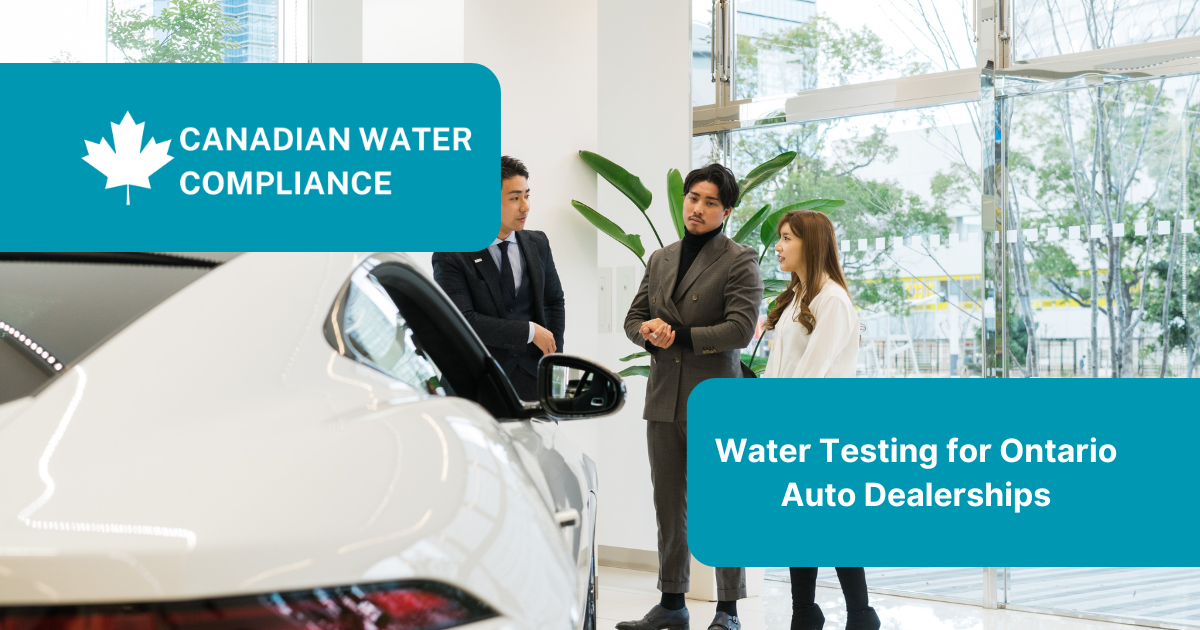
Written By: Canadian Water Compliance | On
Auto dealerships aren’t typically associated with water quality risks, but they should be. From showroom wash stations and customer lounges to service bays, detailing areas, and HVAC systems, water is used throughout automotive facilities. In Ontario, ensuring the safety and quality of this water isn't just good practice—it may be a regulatory requirement depending on how water is sourced and distributed within the facility.
Here’s what Ontario auto dealerships need to know about water testing, contamination risks, and best practices to protect their operations.
While most people focus on vehicles, water plays a vital role behind the scenes. Key water usage points include:
Customer-facing areas: washrooms, staff kitchens, waiting lounges
Service bays: where water is used for engine cleaning, pressure washing, and general repairs
Detailing stations: intensive water use for cleaning and finishing
Heating and cooling systems: boilers and HVAC equipment rely on clean water to operate efficiently
Irrigation systems: used for landscaped dealership lots
Whether water is municipally supplied or drawn from a private source (such as a well), it should be regularly tested for safety and operational efficiency.
Contaminated or unbalanced water can impact health, operations, and equipment. Risks include:
Health hazards: If the water is used for handwashing or coffee machines, it must be free of bacteria like E. coli or chemical contaminants
Equipment damage: Hard water and corrosion can reduce the life of boilers, pressure washers, and vehicle wash systems
HVAC inefficiencies: Poor water chemistry can lead to scale buildup, corrosion, or Legionella growth in heating/cooling systems
Reputational risk: Customers expect clean, professional facilities. Foul smells, discoloured water, or malfunctioning restrooms can undermine trust
Yes. Even if your facility uses municipal water, it's your responsibility to ensure that it remains safe and uncontaminated after entering your internal plumbing system. Cross-connections, aging pipes, or dead ends in the plumbing can all lead to localized water issues.
If your dealership operates in a rural area and uses well water, testing is not just recommended—it's essential. You may fall under provincial guidelines for Small Drinking Water Systems (SDWS) if you provide water to staff or customers.
Depending on how the water is used, recommended tests include:
Microbiological testing: E. coli and Total Coliforms for handwashing stations and food prep areas
Chemical parameters: metals (like lead or iron), hardness, pH, and sodium
Legionella testing: for facilities with HVAC systems, cooling towers, or large-scale hot water tanks
Testing frequency can range from monthly to annually depending on water use, source, and local health unit guidance.
We provide Ontario auto dealerships with comprehensive, no-hassle water testing services including:
Certified sampling for bacteria, metals, and chemical parameters
Legionella testing and HVAC water risk assessments
Well water testing for rural dealerships
Detailed reporting and regulatory guidance
Emergency and follow-up testing if contamination is suspected
We help dealerships maintain professional, health-conscious environments that reflect the quality of their brand.